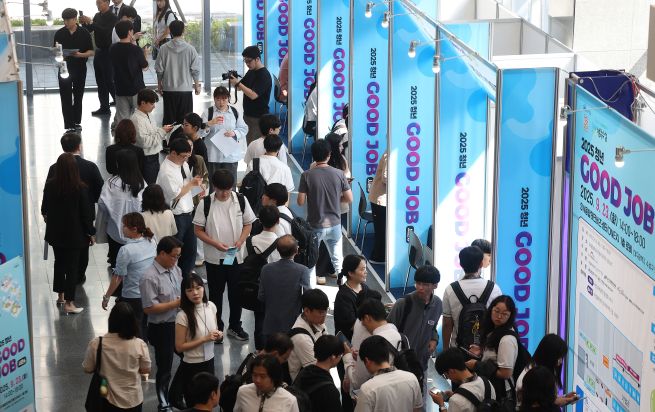
High school job seekers take part in on-site interviews during the 2025 Youth Good Job Fair Season 6, held at the SW Convergence Tech-Biz Center in Suseong Alpha City, Suseong District, Daegu, on September 23. (Yonhap)
SEOUL, Oct. 12 (Korea Bizwire) — South Koreans in their twenties have become the nation’s smallest adult generation for the first time on record, as a long-running decline in births and rapid population aging continue to reshape the country’s demographic landscape.
According to data released Sunday by the National Data Agency, the population of people in their twenties fell by 193,000 last year to 6.3 million, dropping below the number of those aged 70 and older (6.54 million).
 It marks the first time since record-keeping began in 1925 that South Korea’s twenty-somethings have been outnumbered by the elderly.
It marks the first time since record-keeping began in 1925 that South Korea’s twenty-somethings have been outnumbered by the elderly.
The sharpest decline among all age groups, the drop underscores how decades of low fertility are thinning out younger cohorts that once powered the nation’s economy. In 2020, the number of people in their twenties peaked at 7.03 million, but has since fallen steadily by roughly 140,000 to 210,000 each year.
South Korea’s 20-Somethings Shrink to Record Low, Outnumbered by the Elderly for the First Time
Once the largest age group in South Korea, the twenties are now the most underrepresented. In contrast, people in their fifties made up the largest segment last year with 8.71 million, followed by those in their forties and sixties.
The demographic shift is rippling into the labor market. The employment rate for those in their twenties stood at 60.5 percent in August, down 1.2 percentage points from a year earlier — marking 12 consecutive months without improvement. Unemployment among twenty-somethings rose to 5 percent, the highest since 2022.
Analysts attribute the weakening job prospects to a shortage of quality positions and a growing preference among major companies for experienced hires over entry-level recruits. A survey by the Korea Economic Federation found that 28.1 percent of new hires at South Korea’s 500 largest companies last year were experienced workers, up from 25.8 percent a year earlier.
Economic headwinds — including a slump in manufacturing and construction linked to U.S. tariff policies — have further limited opportunities for young jobseekers.
Experts warn that the shrinking and struggling 20s cohort could have far-reaching consequences for social and economic vitality. “The decline in young population and employment difficulties are directly tied to the nation’s economic dynamism,” said Kim Kwang-seok, an economist at the Korea Economic and Industrial Research Institute. “In the long run, this could deepen structural problems such as low birth rates and population aging.”
Ashley Song (ashley@koreabizwire.com)
